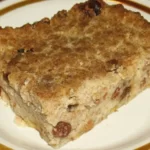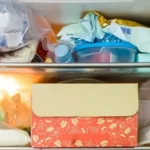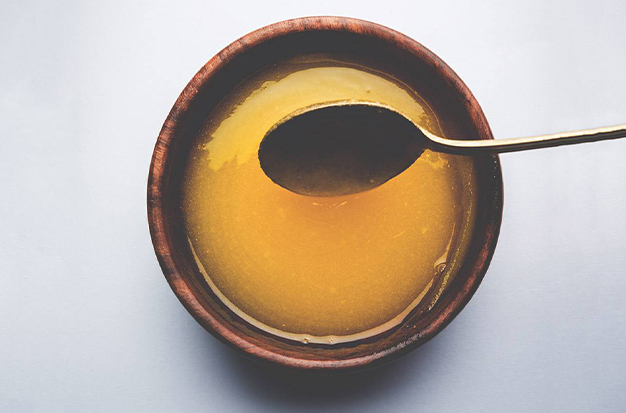
Does ghee require refrigeration?
For those who are not familiar with the term, ghee is a type of clarified butter made from cow or buffalo milk that is primarily used in India. And based on this description, it might seem that ghee, like regular butter, belongs in the refrigerator. But is that really the case?
Does ghee need to be kept in the fridge? Ghee does not require refrigeration. This is due to the removal of milk solids from ghee during the preparation process, which somehow makes it shelf-stable. Its lifespan will undoubtedly be extended by refrigeration, though.
However, this was just a quick way to put it; if we really want to understand this subject, we’ll need to delve a little deeper.
Therefore, let’s begin without further delay.
Table of Contents
What Is Ghee?
Clarified butter is all that ghee is.
Frequently, butter that has been simmered to obtain it is 100% fat.
Although it originated in India, it is now widely used in many other South Asian and Middle Eastern nations.
Although its typical color is yellow-golden, you might also come across it in various white colorations.
Additionally, it is very important to various Indian cultures.
And Indians mostly prefer Cow Ghee for consumption as well as other cultural activities.
Let’s now respond to the query!
Does Ghee Need To Be Refrigerated?
Ghee doesn’t necessarily need to be kept in the refrigerator, but doing so will increase its shelf life. Simply put, it’s because ghee is prepared in a way that removes all milk solids.
Ghee doesn’t go bad as quickly as regular butter because of this. It’s still not completely shelf-stable, so it’s especially advised to refrigerate homemade ghee.
Does Homemade Ghee Require Refrigeration?
Since milk solids are removed during the process, not even homemade ghee technically needs to be refrigerated, as was briefly mentioned in the previous response.
But even so, ghee is still a dairy product, and storing it in the refrigerator will increase its shelf life—especially when it comes to homemade ghee.
Is Imitation Ghee Required To Be Chilled?
Imitation ghee needs to be refrigerated to be absolutely certain that it won’t turn into something that is unsafe to consume because many things can change in the original recipe when making “fake ghee.”
Is It Necessary To Keep Organic Ghee Chilled?
Simply put, it’s not necessary to refrigerate organic ghee. We still advise you to put it in the refrigerator because doing so will extend its life by a few months.
Does Ghee Go Bad? How To Tell If Ghee Is Bad?
If you keep ghee in a temperature-controlled environment, it won’t go bad for a few years. Yes, there is a date on the label, but it only tells you how long the manufacturer guarantees the best flavor. Ghee could, and usually does, continue to be of high quality for months after that time.
Ghee doesn’t necessarily last indefinitely, though.
There are a few circumstances in which your ghee might no longer be appropriate for cooking. Those are:
- Ghee is rancid. Like oils, ghee turns rancid when left in unfavorable storage conditions or for an extended period of time. Ghee that has gone rancid has a distinct odor (as opposed to the typical milky-sweet one), a sour flavor, and is frequently a stark white color.
- It smells off. It could be stale or something else could be going on. Use caution if it fails the sniff test.
- Mold or any other blemishes are visible on the surface. If the jar isn’t sealed properly, that typically occurs. Throw out that ghee.
- Any longer, the quality is insufficient. The flavor and aroma of your ghee might have changed if it has been sitting for a few years. You might then choose to throw it away in the interest of quality.
TIP
You don’t have to immediately discard used ghee. It can be applied to the skin as a moisturizer, to remove eye makeup, or to oil your hair.
In case you’re curious, ghee has very little moisture and doesn’t easily go bad because it doesn’t contain any milk solids, unlike butter and virtually every other dairy product.
What Happens To Ghee When It Goes Bad?
If you keep ghee at a relatively constant temperature, it won’t go bad for a few years. Yes, there is a date on the label, but it only tells you how long the manufacturer guarantees the best flavor. Ghee may continue to be of high quality for months after that date—and it usually does.
But this does not imply that ghee is eternal.
There are a few circumstances in which your ghee might no longer be appropriate for cooking. Those are:
- Ghee is rancid. Ghee degrades when kept in unfavorable storage conditions or for an excessively long time, just like oils. In addition to tasting sour and having a distinct odor that differs from the usual milky-sweet one, rancid ghee is frequently a stark white color.
- It smells off. It could be rancid or there could be another issue present. Use caution if something fails the sniff test.
- Mold or any other blemishes are visible on the surface. That typically occurs if the jar isn’t properly sealed. Throw out that ghee.
- The quality is no longer satisfactory. The flavor and aroma of your ghee may have changed after a couple of years. You might then choose to toss it out of concern for quality.
You don’t have to immediately discard used ghee. It can be used as a moisturizer, hair oil, or eye makeup remover.
In case you’re curious, ghee doesn’t spoil easily because it has very little moisture and doesn’t contain any milk solids, unlike butter or pretty much any other dairy product.
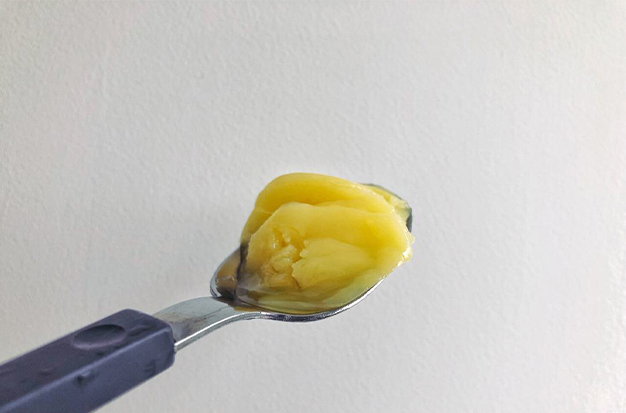
When Should You Throw Away Ghee?
Even if your ghee hasn’t yet gone bad, there are a few instances when it’s best to throw it away. Here’s what to look out for:
- A stain or mold growth has appeared. If you don’t properly seal the container holding your ghee, moisture and bacterial contamination could enter and cause discoloration. Before using ghee, make sure there is no mold or discoloration.
- It has gone rancid. Ghee turns rancid when it oxidizes or is left out in the elements for an extended period of time. Ghee that has gone rancid may appear white rather than yellow and have a sour flavor and odor.
- It has existed for a while. Oils naturally deteriorate over time, even in ideal circumstances. If your ghee has been sitting in the back of the pantry for a while, throw it out and start over with a new jar.
- It smells or tastes “off.” You should rely on your senses when it comes to food for a reason. It’s best to just throw your ghee away if it has lost its original milky-sweet scent and mildly nutty flavor.
How To Store Ghee?
Ghee should be kept at room temperature in a cool, dark area that is out of the way of strong sunlight, heat, and moisture, unless the container specifically states otherwise. Ghee must be stored properly to avoid deterioration. Follow these simple guidelines to enjoy your ghee for a long time:
- Choose an airtight container. Your ghee will be shielded from contaminant-caused spoilage by a properly constructed, well-sealed container. If it comes in a glass container, make sure to tightly shut the jar after use. Always spoon it out or pour it straight from the jar using a clean, dry utensil.
- Refrigerate to extend the shelf life. Ghee that has been refrigerated can remain open for up to a year. Ghee will solidify after being refrigerated, similar to how coconut oil does, but it should still be soft enough to scoop out for toasting or sauteing. Allow your ghee to come to room temperature in a dark, cool location if it is too difficult to scoop out of the jar.
- Use the freezer for long-term storage. Although there will be a gradual loss in quality over time, freezing your ghee should theoretically extend its shelf life indefinitely. An airtight container or freezer-safe bag can be used to store ghee for later use. To remember when the container was made, write the date on it. Refreezing is not recommended as it can result in freezer burn. When you’re ready to defrost the ghee, keep it in the fridge for the night.
How Long Does Ghee Last?
Ghee maintains quality for at least the period indicated by the “best-by” date on the label, which is typically one to two years of jarring. If you treat it well, it keeps its quality for months after that time. For the best quality, use the contents of the jar within six months of first opening it.
There is a best-by or use-by date on every ghee container. You can find out how long the fat will be at its best on that date. Ghee won’t suddenly start to spoil a day or a week after that date. In other words, you can use it after the labeled expiration date.
Generally speaking, the quality of the fat will gradually deteriorate. That means you can use it for months after the best-by date if it’s still safe to eat (check the section on ghee going bad).
The fridge is a better long-term storage option than the pantry, as I already mentioned. Although it may gradually lose quality over time, ghee kept in the freezer will remain safe for an indefinite amount of time. See more about Does Sriracha Need To Be Refrigerated?
Can You Freeze Ghee?
If you have a surplus of ghee and won’t be using it soon, freezing works great (contemplate: in a couple of years). Here’s how to do it:
- A container should be chosen to freeze the fat in. If the glass container in which your ghee is stored is not designated as safe for freezing, you must first transfer the product. Alternatively, use freezer bags or an airtight plastic container.
- Divide your entire stock of ghee into several portions if you only use it occasionally. Each serving should provide enough ghee to last for about a month.
- The container or bags can be given a name and label, if you like.
- All of it should be placed in the freezer.
That’s it. As you can see, freezing ghee doesn’t require any extra steps, and you can do it in no time. The fat should be refrozen over night.
What Makes Ghee Storage-friendly?
Saturated fats are present in ghee, along with some vitamins that are fat-soluble. Ghee is a dairy product that can be stored for a long time because none of its ingredients are perishable. Conjugated linoleic acid, omega fatty acids, butyric acids, and other beneficial fatty acids are found in ghee. Ghee contains vitamins A, D, E, and K on the list of vitamins. Ghee is suitable for storage due to its high vitamin and fatty acid content and low water content.
You don’t need the assistance of a refrigerator to store ghee if you keep it in your kitchen in an airtight container (especially in a dark jar) and can regularly remove ghee from the jar using a dry spoon.
Ghee made from pure, unadulterated cows doesn’t need to be refrigerated. Pure cow ghee can be kept in the kitchen for up to a year after it is made. If you want to keep the ghee 100% quality assured after 12 months, you can store it in the refrigerator.
Ghee need not be kept in a refrigerator or any other type of cold storage otherwise. and as a consumer, you can buy ghee in bulk quantity.
Few storage formalities, in the opinion of dairy experts, can prolong the storage life of ghee. These are referred to as ghee-storage protocols. Here are some answers to your question “should I refrigerate ghee” regarding the storage requirements for ghee:
- Ghee should always be stored in an airtight container. Do not leave the lid unlocked or open.
- The ghee jar should always be kept on a dry kitchen shelf.
- Your ghee’s quality could be ruined by exposure to light or humidity. The oil’s ability to store for a long time is compromised if ghee goes rancid.
- Never put your fingers near ghee. Ghee quality can be damaged by human contact, which also reduces its shelf life.
- Take the ghee out of the jar without using a wet spoon.
The short answer to the question “should I refrigerate ghee?” is no, but you must abide by the guidelines listed above to preserve ghee’s shelf life.
Regarding ghee’s shelf life, we have provided all the advice we know. The longest shelf life and best storage friendliness are only provided by pure Grass-fed ghee. In order to choose the best ghee from the many options available, you should be aware of the standard response to the question, “Should I refrigerate ghee?”
- Always purchase real grass-fed ghee.
- Verify the ghee’s natural origin and absence of preservatives.
- Verify the ghee manufacturer’s suggested storage method. The product should be thrown away if the manufacturer advises you to keep the ghee in the fridge.
- Attempt to learn as much as you can about the ghee smoke point. Only pure ghee has high smoke points and is storable.
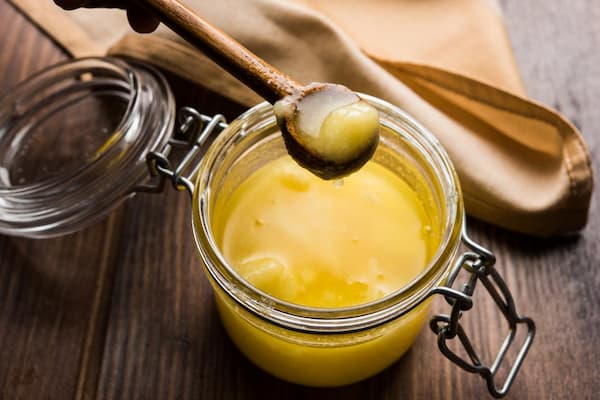
How To Avoid Ghee From Turning Bad?
Here’s a list of things you should avoid if you want to keep your Ghee fresh for a long time –
Store It in An Airtight Container
That’s correct!
If you made it yourself, only keep it in an airtight jar.
Additionally, attempt to keep it in a glass jar.
It is protected from moisture and harmful bacteria thanks to the airtight jar.
Don’t Place the Jar Near Sunlight
Avoid exposing it to direct sunlight.
Avert placing it where your ghee jar will be directly exposed to the sun as well.
Heat is produced inside the vacuum space when sunlight enters the jar.
Additionally, this excessive heat produces extraneous moisture, which is bad news for ghee.
The clarified butter can easily be ruined by excess moisture.
Don’t Place It Near Heat Or Steam
Like I mentioned in the previous point, too much moisture can cause your ghee to spoil.
Therefore, if you want to prevent it from happening, make sure you don’t put it anywhere near heat or steam.
Additionally, you might think about keeping it in the refrigerator if you can’t avoid humid weather.
It will last even longer this way and be completely fresh.
Don’t Use a Wet Spoon to Take It Out from the Jar
The spoon must be entirely dry.
Make sure the spoon is dry and clean before attempting to scoop any Ghee out of the jar.
The spoon’s surface shouldn’t have any mud or water on it.
Clean the spoon with a kitchen towel if you see anything like that on it.
Additionally, avoid using the spoon that is also used for other kitchen tasks.
It will without a doubt spoil quickly if it comes into contact with foreign particles.
Ghee is one of those kitchen ingredients that does not get along well with other foods.
So, when using the spoon, be sure to do as suggested.
Use It Whenever You Can
You shouldn’t wait until it spoils, despite the fact that it has a fairly long shelf life.
Consequently, utilize it frequently.
After all, it’s just another perishable ingredient for cooking.
It eventually gets spoiled if you don’t use it.
You will also have to discard it, which you would prefer not to do with something as priceless as ghee.
Okay, I sincerely hope you heed this advice.
FAQs
Does Ghee Expire?
The date on the label is only there as a guide to how long the fat should keep its best quality. Ghee can be kept for months after that date if it is properly stored.
How Long Does Ghee Last Unrefrigerated?
It really depends on the manufacturer and the kind of Ghee you use at home.
Typically, there won’t be any problems keeping it going for up to 12 months!
That’s true!
One of the uncommon ingredients that keeps for a very long time is ghee.
But be sure to adhere to the handling and storage instructions listed on the package.
If not, it could become rancid in a matter of days, not weeks.
Regarding the refrigeration procedure, it only contributes to the extension of these products’ shelf lives.
In order to extend the shelf life of your ghee, you can store it in the freezer or refrigerator.
Tip – While purchasing it from the store, be sure to check the best-before or expiration date.
Can Ghee Go Rancid?
Yes, it can!
Ghee can become stale just like any consumable product.
It does have a long shelf life, but after a year or so, it starts to become sour and liquidy.
Additionally, it can become rancid more quickly if the storage conditions aren’t ideal.
You might also notice some mold growing on its surface if it comes into contact with moisture or other food particles.
Does Bulletproof Ghee Need to Be Refrigerated?
If you didn’t already know, Bulletproof is a well-known Ghee producer in the US.
Having said that, any Ghee may be chilled or kept in a pantry that is not closed.
Exactly how long you want to keep it at home will depend, as I mentioned in the guide above.
You can leave it outside for at least 3 to 4 months if you want to regularly enjoy it.
It’s best to keep it in the refrigerator even if you only use it once or twice per month.
What Does Bad Ghee Look Like?
You’ll notice a color change when Ghee becomes contaminated.
Additionally, a strong smell will be coming from it, which is a more obvious sign of whether it has turned bad or not.
In addition, ghee is another option.
You should think about throwing it away completely if it tastes different from the mild taste that it usually has.
With that said, I believe I should now wrap up this manual.
The information mentioned above should help you find answers to some of your questions about it.
Conclusion
Ghee doesn’t have any proteins, sugar, or milk solids like regular butter does. As a result, ghee doesn’t need to be refrigerated and can be kept at room temperature for four months!
But keeping that in mind, placing it in the refrigerator will at least slightly extend this lifespan because ghee can last for up to a year in the refrigerator.

